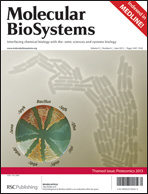Red blood cell metabolism under prolonged anaerobic storage†
Abstract
Oxygen dependent modulation of red blood cell metabolism is a long investigated issue. However, the recent introduction of novel mass spectrometry-based approaches lends itself to implement our understanding of the effects of red blood cell prolonged exposure to anaerobiosis. Indeed, most of the studies conducted so far have addressed the short term issue, while the limited body of literature covering a 42 days storage period only takes into account a handful of metabolic parameters (ATP, DPG, glucose, glyceraldehyde 3-phosphate, and lactate). We hereby performed a mass spectrometry-based untargeted metabolomics analysis in order to highlight metabolic species in erythrocyte concentrates stored anaerobically in SAGM additive solutions for up to 42 days, by testing cells on a weekly basis. We could confirm previous evidence about long term anaerobiosis promoting glycolytic metabolism in RBCs and prolonging the conservation of high energy phosphate reservoirs and purine homeostasis. In parallel, we evidenced that, in contrast to aerobic storage, anaerobiosis impairs erythrocyte capacity to cope with oxidative stress by blocking metabolic diversion towards the pentose phosphate pathway, which negatively affects glutathione homeostasis. Therefore, although oxidative stress was less sustained than in aerobically stored counterparts, oxidative stress markers still accumulate over anaerobic storage progression.

- This article is part of the themed collection: Molecular BioSystems 2013 Proteomics

 Please wait while we load your content...
Please wait while we load your content...